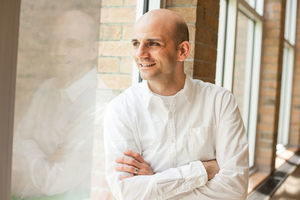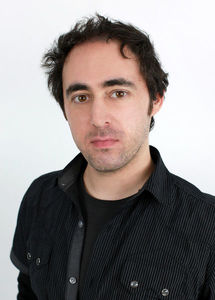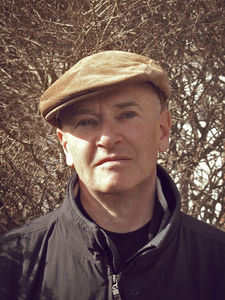"What's Your Story?" Obpo Writing Contest Winners! Part Two: North York
We're excited to bring you the second instalment of the Ontario Book Publishers Organization's inaugural What's Your Story? writing contest winners. The competition asked authors across the city to draw inspiration from their local neighbourhoods, translating the vibrancy, diversity, and energy of Toronto into writing. The competition focused on the "inner suburb" neighbourhoods that are often under-represented in our local literature: Etobicoke, North York, East York, and Scarborough.
Today we're highlighting the winners from the North York region. For the competition, authors submitted writing samples to prove their literary merit, which were judged without any knowledge of the author's identity. Once four samples (three from the established author category and one from the emerging) were selected as the strongest and most compelling, those authors were contacted and asked to write an original piece that captures the essence of North York.
We're proud to present the four original, commissioned pieces from our North York winners: in the Established category Domenico Capilongo, Richard Rosenbaum, and Kenneth Sherman, and in the Emerging category, Sara Y. Cunningham.
Stay tuned in the coming months for the winning entries from East York and Scarborough, to be published exclusively on Open Book. You can also see our previous posting, featuring the winners from the Etobicoke region.
Established Writer Category winners, North York region
in a north york minute by Domenico Capilongo
here things like to slow down. in a sweep of green park beside the pound of pavement up goes another condo but still she steps out into her garden to check tomatoes as if they are her children now grown up and moved away to start their own families. here a smile still means something even if heads barely come up from cellphones for air. schoolyards are still loud and birds don’t care if you’re on twitter. here in this minute all of us are in the same room. the sound of languages mingling up to this ceiling of blue sky. here stuck in the traffic between our beating hearts he holds the door open to the library. here the sun hugs us differently as though nothing matters but everything's important. all of these people passing through in this minute. I stop and take a left turn up a side street to slow down and feel the grass between my toes.
_________________________________________________
Video Invasion by Richard Rosenbaum
When video arcades were still a thing, this was the one, a transcendent world to crawl into and get lost in. Unsurpassed and, since the rise to ubiquity of home consoles, probably now unsurpassable. Video Invasion, at 3500 Bathurst Street, halfway between Avenues Wilson and Lawrence, hosted some of the most glorious, most tinnitus-inducing birthday parties that a twelve-year-old North Yorker could ever hope for. Inside, its atmosphere bulged with screams of virtual triumph and of digital mortality, incense of pizza grease, and clinks and bleeps of coin-operated spacecraft piloted by highly caffeinated preteens. You know, the way God intended.
This was where, over the course of a single afternoon, you’d spend like sixty bucks of your parents’ hard-earned money in tokens to beat Turtles in Time with three other kids from Hebrew School; where you’d perfect your machine gunning skills on the Terminator 2 cabinet (although you were still too young to have seen Terminator 2); where you’d learn to fly everything from a blimp to a UFO in Time Pilot. There were kind of a lot of time-travel themed games, come to think of it. Oh, also, there was an actual functioning time machine. That was probably a coincidence.
Your CanLit News
Subscribe to Open Book’s newsletter to get local book events, literary content, writing tips, and more in your inbox
If you were the birthday boy or girl inevitably at some point during the celebration, usually after cake but before vomiting from eating too much cake (or from eating the plastic cake decorations that were not really edible but just looked so delicious that you couldn’t help yourself – and actually were pretty tasty, so, you know, no regrets) an arcade employee would come find you and ask you a question.
This man or woman was about your age – your age now, as you read this. On his or her face lived a look of exhausted exhilaration, as if having this much fun as a job was just barely bearable. The employee wore an apron with the arcade’s laughing, bowling-pin shaped clown-mascot embroidered on its front. You could be forgiven for assuming at first that this employee was in the family way, but no, rather it was the apron, a garment composed entirely of sewn-together pockets, that was itself pregnant with tokens –the arcade’s own minted scrip, gold-coloured coins costing one-third of a dollar, which you had to use for the games in lieu of cash. And so, with each step the employee took, a clanging carillon radiated in every direction, the tokens’ sound drawing children into the employee’s gravity like some postmodern Pied Piper. You know that story? Yeah, it was a lot like that.
The question, the question that this jangling, animated employee asked you on your birthday, was this: do you want to see the time machine?
So you went to see the time machine. Because of course you did.
Shown to a back room, not hidden but with PRIVATE stickered across its door at adult-height and cordoned with velvet red rope that might as well have been a force field for its obstructive effect. That rope the employee moved aside like it was nothing, opened the door for you, and you entered. With the door closed again behind you the arcade’s chaos vanished; this room was silent. Inside: time machine, just as promised, resembling precisely the one from that H.G. Wells novel you read last summer – a clockwork affair, not a car but more of a treadmill inside a pair of shining rings, each maybe seven feet in diameter, interlocked with one another at ninety-degree angles. All nickel and ivory and quartz and dials and levers. Below the control panel, a coin acceptor reading INSERT SIX TOKENS. Most expensive machine in the whole damn place, but you got inside and did what it said.
And it worked.
Around you hours and then years flew forward. Walls all turned clear and you could see through the room, through the building, through the world. From your privileged point there on Bathurst Street, you watched history run ahead as if there were a prize for the first person to get to the end of it. That person was you and the end was today. Today, the day that you read this. Because it was your birthday, you got to see it with your own two eyes. The invasion. The video invasion.
What you always believed was the image of a clown in the shape of a sort of flattened lemniscate, you now learned, was in fact the transgression into our world of something the human eye and mind could never truly comprehend. They were everywhere, everywhere – in every building, every room; in every hidden corner, just on the other side of every surface. Behind the bookcase. Under the fridge. Where did they come from? What, if anything, did they want? You didn’t know. You’d never know.
As fast as it forwarded, history then reversed, and you returned to your birthday party with information but not understanding. Played some Time Soldiers. Vomited cake.
What you saw that day never left you, and nobody who hadn’t celebrated a birthday there even believed when you told them. Who could blame them? But everyone who had, did. It wasn’t a dream. All the accounts matched up.
Of course, today has arrived and clearly there’s been no invasion. Not in any way you can perceive. Just look around you. The arcade’s not even there anymore. What was it that you saw that day? A warning? A promise? An image of what would be or of what could be? It’s impossible to know. Everything about that place is gone now except its memory and maybe, at the bottom of some forgotten drawer somewhere, in a house in which you no longer live, a gold-coloured coin or two. The only sign remaining that once you were young. You’re sure that you were. You must have been.
_________________________________________________
North York, Back Then by Kenneth Sherman
It was not yet a place of identity,
the ancient farm fields slowly swallowed,
the two-bedroom bungalows housing the families
of merchants, masons, mechanics,
and deep down, beneath the newly erected plazas
with their supermarkets, restaurants and luggage stores,
the bones of the Mohawk mourning lost trees.
The city was expanding. The district
offered post-war possibility: A private garage,
a sizable yard for a sandbox and swing.
On kitchen radios, breakthrough rock and roll,
and from those few houses where the alien antennae rose,
a melodramatic organ from The Edge of Night, shrieks
from The Price is Right, live laughter from Your Show of Shows.
In the bleached portables of our overcrowded
grade school we recited the Lord’s Prayer,
as a young Queen smiled from her photo on the wall.
The avenues — Glengrove, Glen Rush, Glencairn —
nostalgic for Scotland, led to ravines of mulch
wild with the scent of danger
and open to the agonies of pirates or gunslingers.
Municipality of mobile carnivals!
Heroes of sandlot baseball!
Pergola of hyacinth stars!
Evenings on the summer porch
we spit out cherry pits
imagining the coolness off Lake Ontario
while staring at a dusk-clouded road heading farther north.
_________________________________________________
Emerging Writer Category winner, North York region
Elevator Muse by Sara Y. Cunningham
The elevator always smelled like pee in Albany’s apartment building. Someone kept peeing in it so that’s why. She lived on Leith Hill Rd in a bright three-bedroom with parquet floors, a balcony, two sisters, her mother, replacement budgies, a hypothetical father (who might have carried a black IBM messenger bag on the subway) and not much furniture. She shared a pink bedroom with her younger sister and I was not allowed in any of the other bedrooms.
We did not lean against the elevator walls. We did not admit to pressing all the buttons so the doors went ding on every floor. O.K., maybe if we had been climbing fences (the pool had a tall chain-link one that was kept locked until August) or the tree in Dallington Park with the knobby shadow. On those days, we might slump together in the pee corner and laugh until it hurt so much and strangers told us to be quiet already and wash our hands.
You know, the heat was immense. Our eyelashes dewed with sweat as we darted between islands of shade. When they flooded, we said “there goes the neighbourhood” because we had heard it somewhere before, and raced onward. I honestly think the cicadas made louder sounds than our shrieks of joy or terror or whatever as we flattened the cut-grass on our way home. When we tumbled across the lobby, hearts thumping, and made it into the cool and gloomy elevator, it was like all miracles were real.
But, it still smelled pretty bad in there.
Sometimes, we played with another girl. Crystal was our numerouno for anything that did not smell like soap or incense. She went to Dallington Public with the newer playground, a crossing guard, and no Jesus Christ. Her school was only a block away from St. Timothy’s Catholic Elementary, where we had cramped desks and a bunch of portables.
Crystal lived down the hall from Albany with her dad. He had scraggly, shoulder-length hair that had gone prematurely white, for private reasons. He wore denim on Levi’s, and I think he was an electrician.
Once, he took the elevator with us. I was standing closest to his faded jean-jacket, and Albany was leaning against me, hiding her face in her hair. I caught one whiff of stale cigarette smoke and alcohol that made my eyes sting, and I held my breath. I thought, or am thinking now, of my mother’s obsession with vacuuming the Mazda—how all the rooms in our detached house smelled like fake lemons. My legs started to wobble, and I staggered forward.
Crystal’s dad caught me by the armpits. He said, “Whoa, kiddo” and Albany fanned my face with a McDonald’s napkin that was stained with BBQ sauce. I fainted for real then and someone took me home.
One evening, our mothers sat under a portrait of a man in the living room. He was either Albany’s father or the prince of something. The air still held the warmth of the day, and I was sliding off this green plastic chair from the balcony like a banana peel. Albany was nodding away on the other side of the room, cheek in hand.
On the wall above my mother’s head, next to a noisy clock, hung a poster of Manila! that was curling at the corners. That’s where Albany had lived her other, tropical life. Where she and her sisters had worn school uniforms like Sailor Moon, and had kept diaries in cursive writing that was impossible to counterfeit. And, where her father had hoisted her onto his warm, tanned shoulders above the crowd so that she could watch the crucifixion on a vey hot day.
“A crucifixion,” said our religion teacher, Mr. Murray, whose shirts had all shrunk in the wash.
“He believes in what exactly?” Albany said after class, blinking sunspots or tears from her eyes.
“Nothing,” I told her, although I really had no idea. That story of hers always scared me.
I learned all the words to Hail Mary like I was told. Nobody cared at my house so I recited it with Albany on the balcony. From the eighteenth floor, the traffic on Sheppard Ave could sound like waves pulling away from a cliff. The clouds above her building often looked like broken animal crackers.
My thighs were sticking together in the heat, and my mouth was dry from hailing Mary for so long. One of my arms looked sunburnt. Albany was leaning too far over the railing, transfixed by a wind chime dangling below us. I sucked the rosary beads to get my saliva flowing again.
Albany turned around, and laughed at me, then saw her mother, who had appeared behind the glass door, cradling a wireless phone to her ear. She poked her head out to tell us that Crystal was coming over. I think we must have rolled our eyes, because she said something in Tagalog then that I did not understand.
“Fine,” Albany said, “we’ll play with her, her, her.”
“No chanting,” said her mother sharply. And we stopped doing it for the afternoon.
Later that summer, we found Crystal standing by the elevator in the lobby. There was an out-of-order sign taped to the metal doors that reflected her small body. She was still swimming in her pajamas from the night before, her face a grey and pink smear in the improvised mirror.
We watched her for a time and then, without speaking, Albany and I crossed the tiles to the stairwell, avoiding the grout. Crystal seemed almost heavy to me, like one of the stones we threw into the creek in the ravine, where the water was clear and rippling and quiet all at once.
“What do you think she’s doing?” Albany asked. She was whispering and still there was a faint echo.
“I dunno,” I said. “Maybe she’s praying.”
“She doesn’t pray, remember?”
The air in the stairwell was thin and stale. We were very high up already. It kind of felt like we were scaling a mountain. Our chests heaved uncontrollably and our faces must have been ruddy, like they’d been scrubbed by my mother on one of her cleaning sprees. We pushed on, until Albany stopped short ahead of me.
When I came up beside her, I saw why. There was a pair of running shoes, a denim jacket, t-shirt, and Levi’s jeans strewn on the next landing. The pant legs were standing semi-upright as if the naked legs had vanished from inside of them, rather than stumbling away. The shoes had fallen on their sides haphazardly, as if someone had come home in a stupor and had thrown them off, in a great hurry to crawl into bed. Only, we were in a stairwell, and there was no bed.
“Don’t touch them,” I said to Albany, who was stooping over the jeans. I pulled on the strap of her tank top.
“Wait a minute,” she said, “the wallet’s still in there.” She pulled a beaten-up leather billfold out of the back pocket and held it up to me. It was bulging with cards and paper money.
“See?”
She turned it around several times, as if it reminded her of something. She looked at me and then back at the clothes for a moment, and then deposited the wallet into one of the white sneakers. Then she kept climbing. I followed, stepping over the orphaned outfit as if it had belonged to a ghost.
Actually, that episode reminds me of something else that happened in the elevator, although it was less spectacular, by comparison.
I remember that Albany’s head hung down so low that her hair swept the dirty floor. And I tried to get her to stand up straight, push the hair behind her ears so I could see her face. She resisted and muttered something that I only half heard, or can’t fully remember. Maybe her budgies had died again or her dad had come home so late again, or not come home at all again, and it felt like he was the one on her shoulders.
All I know for sure is that after we found Crystal alone that morning, we did not play with her anymore. By that I mean, no one asked us to. We spent the rest of the summer praying to Mother Mary to make what we wanted come true. We ran on the track above our school until our lungs burned and our eyes bleared because everything reflected the sunlight back to heaven, or at least to Albany’s balcony on the eighteenth. Although, there are times that I think my memory of that summer is too bright, and so more perfect than it should be.
__________________________________________________________________
Stay tuned to Open Book for the original, commissioned texts from the winners in the regions of East York and Scarborough over the coming months!
The OBPO and Open Book gratefully acknowledge the support of The Ontario Media Development Corporation, The Toronto Arts Council, Arts Etobicoke, North York Arts, East York Arts, and Scarborough Arts in making this contest and these original pieces possible.







